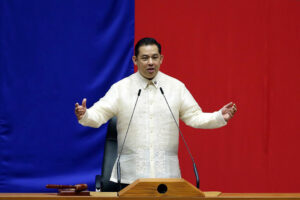By Kenneth Christiane L. Basilio
SPEAKER Ferdinand Martin G. Romualdez said Sunday that Congress is on the verge of amending the Rice Tariffication Law, citing how the two chambers have come to resolve contentious issues in the bill.
“It is still ongoing, but it seems that an agreement between the House of Representatives and the Senate is near,” Mr. Romualdez said in a statement.
Previously, Romualdez said senators were deliberating independently of the House but were open to amending the law.
It remains unclear, though, whether or not senators have already agreed to restore the National Food Authority’s (NFA) power to import and sell rice at subsidized prices.
Senator Cynthia A. Villar, who chairs the Senate Committee on Agriculture and Food, previously bucked the proposal in House Bill (HB) No. 10381 to reinstate this power to the NFA.
“The main amendment proposed by HB No. 10381 is bringing back NFA authority to import rice and sell to the market in times of rice emergency, experiencing a shortage and extraordinary or sustained price increase,” said Enrico P. Villanueva, a senior lecturer at the University of the Philippines Los Baños Economics Department. “In principle, such a move can lower retail prices in a short time.”
Earlier, Mr. Romualdez underscored that amending the rice law would make the nation’s staple food cheaper.
In doing so, Mr. Villanueva said the important questions to ask are: “At what price or cost to the nation? [and] is this the optimal way to reduce rice prices?”
In July 2010, the NFA’s debt ballooned to P177 billion from the previous year’s P20.9 billion — an eight-fold increase on the back of government’s focus on subsidizing the prices of the staple grain during the 2008 food crisis.
That food crisis “resulted in the NFA’s frantic sourcing from international rice suppliers” to meet local demand, according to a 2020 report by The Asia Foundation.
HB 10381 seeks to expand the budget for the Rice Competitiveness Enhancement Fund (RCEF) to P15 billion from P10 billion and extend its validity for another six years.
Mr. Villanueva said amendments to the RCEF should be considered the long-term solution in making rice cheaper for Filipinos.
“The RCEF is a long-term solution,” he told BusinessWorld through e-mail.” The premise of [the] Rice Tariffication [Law] is to give consumers access to cheaper rice, with the farmers still protected through tariffs that can also be used to directly compensate them — monetarily or through farm inputs.”
“Amending the Rice Tariffication Law is a crucial step towards ensuring food security and economic stability for our farmers,” said Mr. Romualdez.
